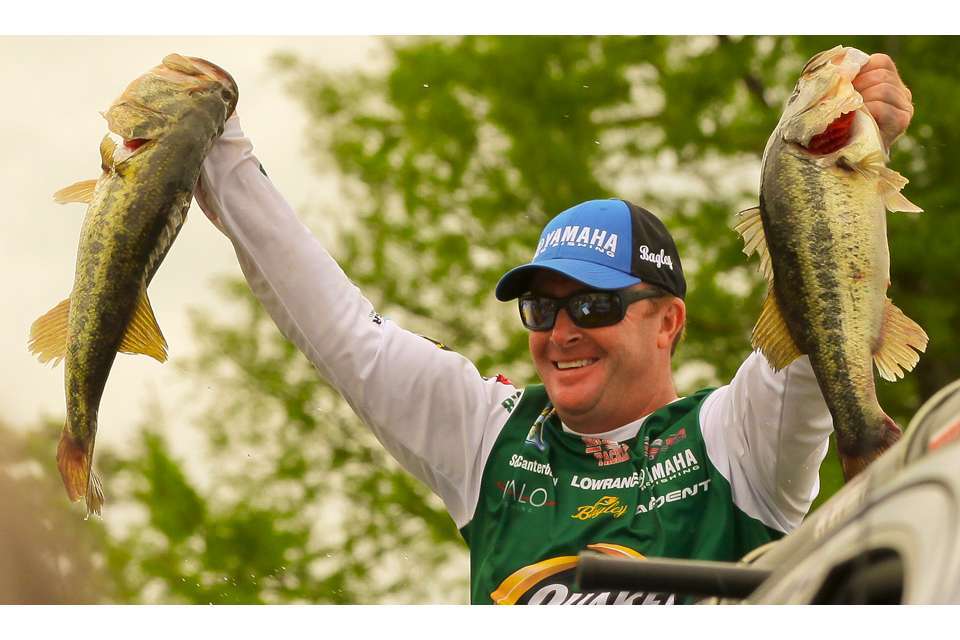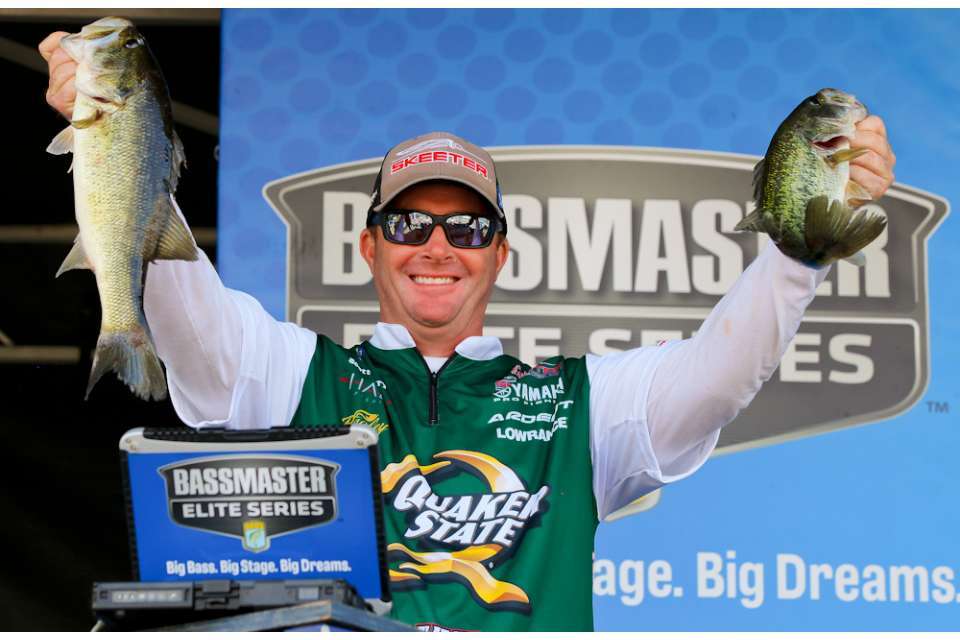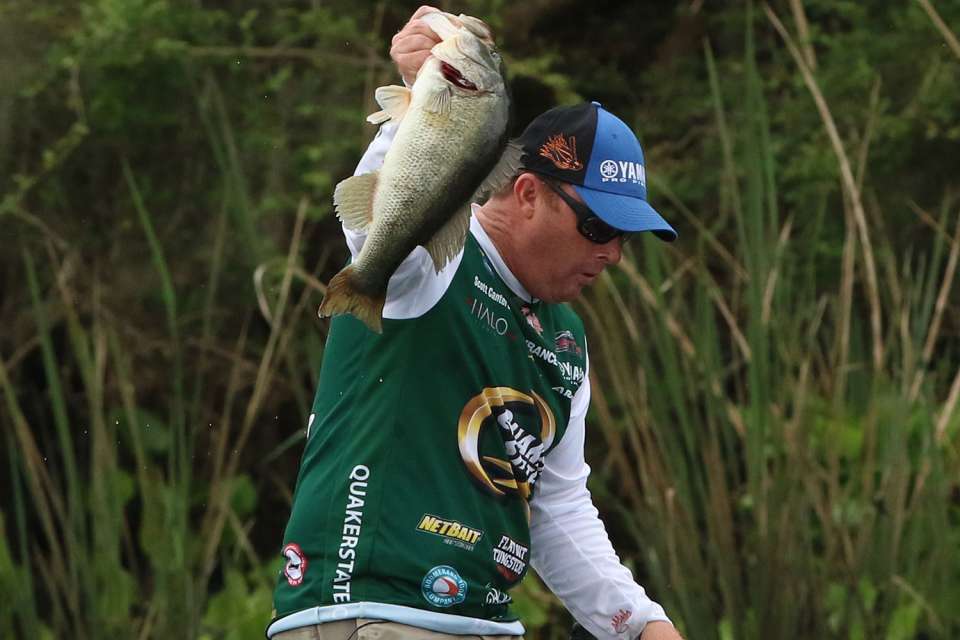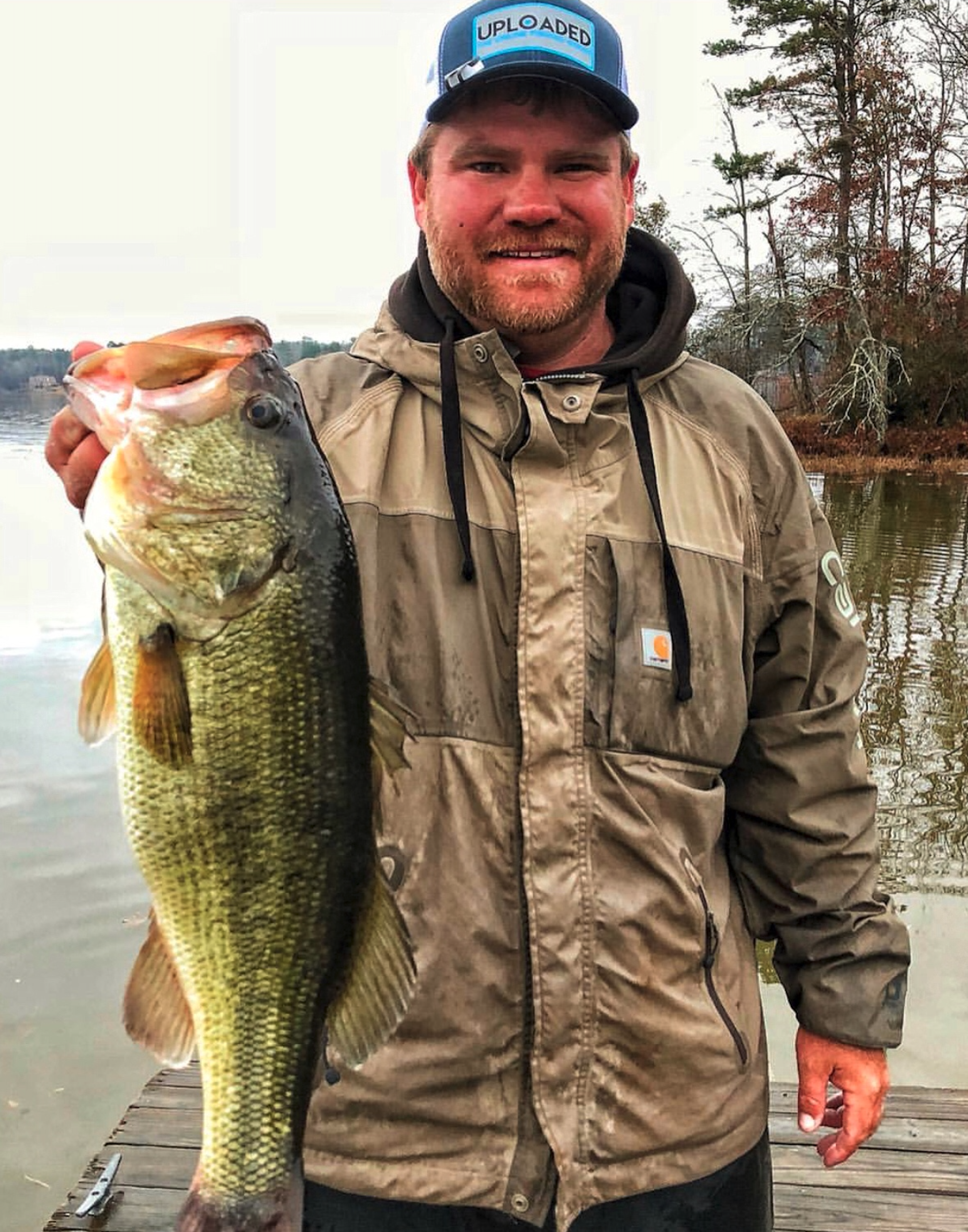
This is the second installment in a five-part series retracing the steps that led Elite Series pro Scott Canterbury to his first Bassmaster Angler of the Year title in 2019. We pick back up at the third stop of the season.
Lake Hartwell
With nothing but opportunity and optimism in his pockets, Canterbury rolled into Hartwell for stop No. 3, and with a heavy dose of history once again.
“I had been there that time of year several times before. I knew the lake really well and knew the fish should have been bedding and trying to spawn,” he said.
But Hartwell has a tendency to warm up in certain areas faster than others.
“I just picked the wrong area to really have a chance that week. I had a pretty good tournament and caught most of the fish I saw. But the biggest fish I found during practice, another boat started on. I mean we sat down at the same time, and he caught it on his second pitch, so that may have changed the outcome a little bit.”
A frustrating start for Canterbury, but not nearly the most frustrating part of the event.
“On Day 2 of that tournament I found a 4 1/2-pounder. I used to say I could catch every one that I saw on a bed. But that fish was just so aggravating. I fished for it for about an hour and 20 minutes and it never looked at my bait. I picked up a swimbait and just reeled it past the bed and she chased it out and swallowed the whole bait, but I missed her.”
The near miss convinced him to invest another 40 minutes into the fish, but it never bit again that day. A similar scenario also played out on Day 3 however.

“I fished for her for an hour,” he said. “She never bit. I picked up a swimbait and threw it in there, reeled it up to the bed and then killed it. She went down on it, got it, swam out of the bed and I set the hook — I missed her again. She just didn’t have the hook. So, I wasted 3 1/2 hours in that tournament on a big fish that I wished I had never found.”
Finishing a solid, but disappointing 22nd place, Canterbury felt as though he had let an opportunity or two slip through his fingers at Hartwell.
Winyah Bay
Prior to the first day of official practice for Winyah Bay, Canterbury had never landed a keeper on the fishery. His practice wasn’t terrible. He found a pattern near the ramp that he felt fairly confident could yield 10 pounds, but he also found a few nice fish up the Cooper River on beds.
“On the last day of practice, I found a 6-pounder on a bed with a 4-pounder. And I saw a 3-pounder,” Canterbury said. “I decided that’s where I’d go for Day 1. I stopped for gas on the 90-mile trip up the Cooper River, and by the time I got to that big fish, another competitor had already fished for it. He didn’t catch it, but he caught the male and said the big one was gone. And he was on the other good fish I had found when I got there. He hooked it and lost it on his first cast and never could get it to bite again.”
A bad luck punch right in the gut had him scrambling to make the best of a long-run investment. He managed to catch 11-15 that day bed fishing.
“My plan going into the tournament was to go over there, catch 12 pounds and just see where that put me. Probably stay close the next day and try to catch 8 to 10 pounds, get a check and move on.”
But that 12 pounds had Canterbury in the Top 10 after the first day.
“I had to go back, especially since I culled three times on Day 1 in the last 45 minutes. I went back over there on the second day, and I was going to start where I ended the first day. When I get there, Patrick Walters was in there with a boat or two following and watching him. We talked later that day and he had caught 10 pounds out of that hole the first 30 minutes of the day, and left it — I didn’t even know. But it was a shot in the leg, and I struggled the rest of the day.”
On Day 2 of the fourth stop of the season, Canterbury was in jeopardy of failing to bring a five-fish limit to the scales for the first time all season. With only 45 minutes left in the day, it was decision-making time.
“I knew where there was a little buck on the bed I had found on the last day of practice. But it was 6 miles out of the way from where I was at the time. So, with 45 minutes left to go, I decided to run 6 miles in the opposite direction to a fish I didn’t even mark a waypoint for. I got there, find the fish, make one cast, catch it and that ended up being my fifth fish. It took me up to about 7 pounds.”
That fish weighed about a pound and a half and put Canterbury in 27th place after Day 2, which was 1 pound, 7 ounces ahead of the cutline for Day 3 of competition.
It’s hard to say with absolute certainty, but without that gut decision to invest his last 45 minutes into a small keeper, what happened next for Canterbury likely wouldn’t have been possible as he may have been sitting on the shorelines in 36th watching the Top 35 head out on Day 3. But he wasn’t sitting on the shorelines.
“I ran back over to the Cooper River on Day 3, but I ran further up the river,” he said. “I went all the way to the Santee Cooper dam. I practiced up there and knew there were some fish in the area, I just didn’t know how good it was.”
He boated a couple keepers immediately fishing a Dirty Jigs swim jig over top of and behind the vegetation that was submerged due to the high tide.
“I started up in a little canal and caught a 5-pounder. Then I just started burning the bank with a swim jig. I didn’t have a bite for the next hour and a half but when I did, I caught a 4-pounder.”
Those two fish propelled Canterbury up the leaderboard and into the Top 10, which had him fishing on the final day.
“On Day 4, when I ran back up there the weather had changed, the tide was out, everything was just different and felt wrong,” he said. “I was throwing a swim jig and just reeling it in front of the grass through open water, but it just didn’t seem right. I hadn’t been there 5 minutes but I told my camera guy, ‘This isn’t going to work.’”

After another 10 minutes without a bite, Canterbury called an audible, reached into his rod box and pulled out his signature series Scott Canterbury Pro Buzz from Dirty Jigs Tackle. He wanted something he could cover the open water with since the low tide had pulled all the water out from behind the grass.
“Within 3 minutes I caught a 2-pounder, and I caught three more fish pretty quickly. I hadn’t had a bite on a buzzbait the whole practice or the tournament, but just making that change was key.”
During his pre-practice, he had marked three points on the main channel that were covered in coontail. Though he fished them in practice on a high tide without a bite, still he felt the urge to give them a try.
“I ran to the first point, stood up and the first cast I made I caught a 6-1. My camera guy was still taking his lifejacket off. I fished about 5 more minutes there and then ran to the second spot I had marked with coontail, and the third cast I made I caught a 5-8.”
Canterbury rallied from the mid 30s with 45 minutes left to go on Day 2 to second place by the time the tournament ended. A comeback represented by a 30-point swing in the Angler of the Year race.
Canterbury was in the lead for AOY at this point with the season half completed. He just had his best tournament of the year, and from there he headed to one of the two fisheries he was most optimistic about when the schedule was announced.
Follow Canterbury’s full season:
Part 1
Part 2
Part 3
Part 4
Part 5

